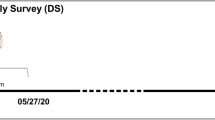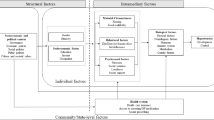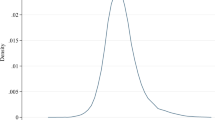Abstract
Objective: Social support, by moderating cardiovascular reactivity, has been demonstrated to attenuate the effects of stress on blood pressure in American communities. This is the first report to examine the relationship between social support and blood pressure in a South African context, during a period of infrastructure modernisation and political change.Methods: A total of 1240 residents (542 men, 698 women) of mixed ethnic origin, older than 14 years and stratified by age and sex, participated in a survey to determine risk factors for hypertension and cardiovascular diseases. Social support was assessed by a questionnaire developed in consultation with the community. It was defined by interactions that may threaten family harmony (score 1) and by networking between relatives, friends, colleagues and neighbours (score 2). Results: Mean blood pressure of the sample was 130/79 mm Hg (s.d. 25/14 mm Hg). Hypertension prevalence was 26.9%. Only 36% of women compared to 57.3% of men (P < 0.0001) were employed. more women (29%) than men (22%) reported threats to family harmony, but social support networks were similarly perceived by both sexes. systolic and diastolic blood pressure correlated weakly with score 1 (r = 0.096, P < 0.0007) but no association was observed with score 2. score 1 was not associated with blood pressure by multiple regression analysis, that included confounding by age, sex, bmi, alcohol consumption and smoking status. Conclusions: Neither threats to family harmony nor networking between relatives, friends or neighbours, significantly influences blood pressure in this community. Measures of social support thought to moderate blood pressure may have limited cross-cultural application. Attitudinal changes during socio-political transition may impact on the generalisability of instruments for measurement.
This is a preview of subscription content, access via your institution
Access options
Subscribe to this journal
Receive 12 digital issues and online access to articles
$119.00 per year
only $9.92 per issue
Buy this article
- Purchase on Springer Link
- Instant access to full article PDF
Prices may be subject to local taxes which are calculated during checkout
Similar content being viewed by others
Author information
Authors and Affiliations
Rights and permissions
About this article
Cite this article
Daniels, A., Hoffman, M., Lombard, C. et al. Blood pressure and social support observations from Mamre, South Africa, during social and political transition. J Hum Hypertens 13, 689–693 (1999). https://doi.org/10.1038/sj.jhh.1000892
Received:
Accepted:
Published:
Issue Date:
DOI: https://doi.org/10.1038/sj.jhh.1000892
Keywords
This article is cited by
-
Is social support associated with hypertension control among Ghanaian migrants in Europe and non-migrants in Ghana? The RODAM study
Internal and Emergency Medicine (2019)



